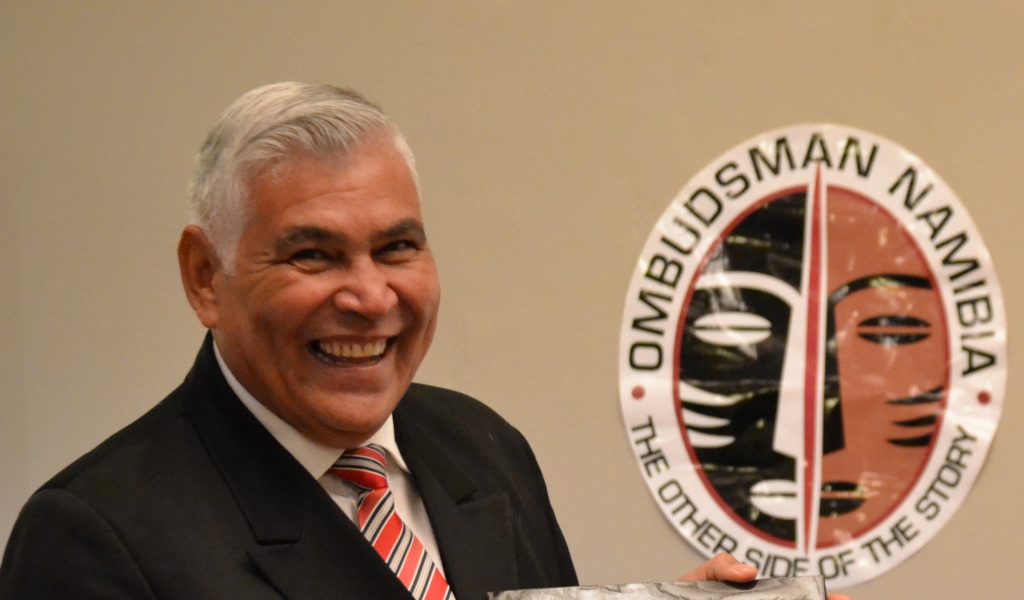In a statement released on 19 July 2021, the Office of the Judiciary announced that Ruth Herunga, Tousy Namiseb and Basilius Dyakugha would be interviewed for the Ombudsman post. The post was advertised and only four candidates applied with the aforementioned three being selected for the interview stage.
The successful candidate will succeed John Walters as Namibia’s Ombudsman. Walters was appointed in July 2004 as Ombudsman by Namibia’s first president Sam Nujoma. Walters served as Namibia’s third permanently appointed Ombudsman since independence taking over the position that Acting Judge Simpson Mtambanengwe held in an acting capacity since the Ombudsman post became vacant with the appointment of second Ombudsman Bience Gawanas as an African Union Commissioner in September 2003. According to the Constitution, the Ombudsman should either be a Judge or a person possessing the legal qualifications which would entitle him or her to practice law in all the Courts of Namibia.
Internationally, an Ombudsman is usually an independent, non-partisan official who exercises oversight over public administration. An Ombudsman often has the power to investigate, report upon, and make recommendations on individual cases, administrative procedures, and relevant systemic changes.
Namibia’s Office of the Ombudsman was entrenched when the Constitution came into operation on 21 March 1990. The most relevant legal provisions with regard to the Ombudsman are found in Chapter 10 of the Namibian Constitution as well as in the Ombudsman Act (No. 7 of 1990). Initially, the mandate of the Ombudsman in Namibia related to four broad categories: human rights, administrative practices, corruption, and the environment. However, the corruption element was removed in 2010 when the Anti-Corruption Commission was made a constitutional body (although strangely a clause mentioning the misappropriation of funds was left in the Ombudsman’s mandate).
Selection Process
In Namibia, the Ombudsman is appointed by the President on the recommendation of the Judicial Service Commission. The latter consists of the Chief Justice, a judge appointed by the President, the Attorney-General, and two members of the legal profession. The appointing process consists of the Judicial Service Commission’s recommendation and the subsequent formal act of proclamation by the President. In all the appointments of people to the office since independence, the constitutional two-stage appointment process has been observed. With regard to the appointment of an acting or deputy Ombudsman, respective provisions are contained in the Ombudsman Act.
The Ombudsman also enjoys a fixed, long term of office. Article 90(2) of the Constitution provides that the Ombudsman holds office until the age of 65. However, the retiring age may be extended by the President to the age of 70. The Ombudsman Act states that the appointment of the Ombudsman is required to be in accordance with such terms and conditions as the President may determine.
The Office of the Ombudsman is intended to function as an independent. Broadly speaking, the Ombudsman in Namibia investigates complaints about the violation of fundamental rights and freedoms and about the administration of all organs of government. The Ombudsman can try to obtain a compromise between the parties concerned, bring the matter to the attention of the authorities, refer the matter to the courts, or seek judicial review. As the Ombudsman’s role is to recommend an administrative response to grievances instead of issuing binding orders, some argue that the office-holder’s bark is fiercer than their bite.
Complaints may be submitted to the Office of the Ombudsman by any person, free of charge and without specific form requirements. The Office of the Ombudsman cannot investigate complaints regarding court decisions, however. Neither can the Office assist complainants financially or represent a complainant in criminal or civil proceedings.
Ombudsman’s offices are state entities, which means they rely on public funds and must maintain political support for continued funding. The Office, unlike other independent constitutional institutions such as the Anti-Corruption Commission and the Electoral Commission of Namibia, does not have its own budget despite the importance of its mandate.
Challenges
One of the challenges mentioned by the outgoing Ombudsman in a podcast conversation with The Namibian newspaper was the National Assembly’s failure to debate and examine annual reports submitted by his office.
Another challenge is the broadness of the Ombudsman’s mandate, which can be seen as too diverse and fragmented – being spread across human rights, administrative issues, environmental protection, and misappropriation of funds. This makes the role of the Ombudsman difficult to fulfil, especially as the Office is not resourced to deal with all these issues.
In an unprecedented move, the Judicial Service Commission decided to hold public interviews for the shortlisted candidates by livestreaming proceedings. The interviews which were originally scheduled for the 23 July but have been postponed until 27 August. As a result, the term of office for the incumbent, John Walters, has been extended until the end of September 2021. The successful candidate will serve as Namibia’s fourth permanently appointed Ombudsman.
Further Resources
The Constitution of the Republic of Namibia
The Conversation- The Role of the Ombudsman – The Namibian
See – https://fb.watch/733GIIB1bA/
The Role and Effectiveness of the Ombudsman Institution by The National Democratic Institute
See – https://www.ndi.org/sites/default/files/1904_gov_ombudsman_080105_5.pdf
The independence of the Ombudsman in Namibia by Katharina G Ruppel-Schlichting
See – https://www.kas.de/c/document_library/get_file?uuid=0dab1a5f-ac8c-dfc7-a594-106cb2c288a6&groupId=25203

